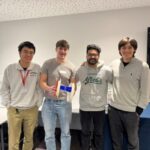Last week’s MFC Wednesday was all about connections, collaboration, and creativity—with a dash of friendly competition!
Bringing together researchers from the CDT in AI Sustainability and Mathematics for our Future Climate (MFC), the day kicked off with networking and collaboration training, helping participants get to know each other beyond just names on a badge. From icebreakers to teamwork challenges, it was all about building bridges (metaphorically, at least at this stage).
Then came the real test of ingenuity: designing and constructing a wind-powered vehicle. Armed with materials, some physics know-how, and plenty of enthusiasm, teams set out to create the most efficient wind-powered machine. Some zoomed ahead, others… learned valuable lessons about aerodynamics the hard way. But whether their vehicles sped gracefully across the finish line or took an unexpected detour, everyone had a blast.
After lunch the students attended an engaging seminar run by Dr. Zhanxing Zhu from the University of Southampton. This seminar was titled “Learning from complex dynamics data for prediction and simulation”:
Abstract:
The Nobel Prize 2024 in both physics and chemistry was awarded to AI pioneers on deep learning methodology and its applications in scientific problems. The interdisciplinary research between AI and science matters. Currently, there are still many challenges and opportunities remaining in other scientific disciplines, such as climate, traffic, material science, and even ocean and earth science, where data are abundant and AI can help.
In this talk, I will introduce some of our attempts on AI4Science, particularly, applying deep learning to learn from data generated from real-world complex dynamical systems, e.g. traffic, weather, and materials. We show how to leverage data-driven approaches to achieve accurate forecasting, system parameter learning and simulating multiple rigid and deformable solids. We are also working on how to integrate first-principle-based physics models into machine learning to produce a hybrid learning framework to tackle the challenges in large systems. We vision that all these new results might also shed light on the research of other scientific domains, potentially raising more opportunities in an interdisciplinary manner.
By the end of the day, new connections had been made, ideas were flowing, and the stage was set for future collaboration. A huge thanks to everyone who took part—see you at the next one!



